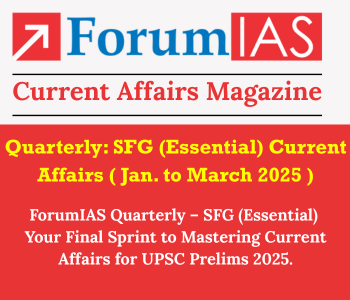We are posting Today’s 7 pm editorial Summary
About 7 pm Editorial Summary – This initiative provides an in-depth analysis of the important news editorial of the day. Students don’t need to look anywhere more for their daily news analysis. We take the most important editorial of the day and provide its comprehensive summary.
For old Archives of 7 pm editorial Summary, Click on “Archives”
Putting the SAGAR vision to the test
Context: India and Indian Ocean Region
The emerging dynamics of international diplomacy has meant that India has recently begun to take note of managing the oceans, especially the Indian Ocean, more seriously. The gain of Observer status is IOC could provide an opportunity to India to learn from it as well as support it to enhance ties in the Western Indian Ocean Region.
This brings us to the question of understanding of Indian Ocean region and IOC with respect to India. In this article we will explain the following:
- What is the importance of Indian Ocean region for India?
- What is Indian Ocean Commission (IOC)?
- What are the major initiatives under IOC towards cooperation in Indian Ocean Region?
- How India can contribute to IOC?
- Conclusion
What is the importance of Indian Ocean region for India?
- The Indian Ocean region consists of 28 countries, spans across three continents and covers 5% of global land area.
- These 28 countries include 21 members of the Indian Ocean Rim Association (Australia, Bangladesh, Comoros, India, Indonesia, Iran, Kenya, Madagascar, Malaysia, Mauritius, Mozambique, Oman, Seychelles, Singapore, Somalia, South Africa, Sri Lanka, Tanzania, Thailand, United Arab Emirates and Yemen), and Brunei, Cambodia, the Maldives, Myanmar, Pakistan, Timor-Leste and Vietnam.
- The Indian Ocean is third largest water body of the world that has vital sea lanes of communication crisscrossing it and which feeds Asia’s largest economies. Around 80 per cent of the world’s seaborne oil trade passes through the choke points of this ocean and therefore it literally connects the east to the west.
- Rich natural resource base: Holds 16.8% of the world’s proven oil reserves and 27.9% of proven natural gas reserves. Economies are involved in iron production, gold production.
- The Indian Ocean is home to major sea routes connecting the Middle East, Africa and East Asia with Europe and the Americas. These vital sea routes:
- facilitate maritime trade in the Indian Ocean region,
- carry more than half of the world’s sea-borne oil and
- host 23 of the world’s top 100 container ports.
- Freedom of navigation is vital for the smooth flow of Indian Ocean maritime trade but threats such as competition among great powers, nontraditional security threats (piracy and drug trafficking) and environmental degradation remain.
- Indian occupies a central and strategic location in the Indian Ocean area. Its national and economic interests are inseparably linked up with Indian Ocean.
- To keep the Indian Ocean as a zone of Peace free from superpower rivalry and increasing cooperation among littoral countries in the region has always been India’s foreign Policy’s goal for example Look East policy, Indian Ocean Rim Association for Regional Cooperation, BIMSTEC and Ganga-Mekong Cooperation etc.
What is Indian Ocean Commission (IOC)?
- Founded in 1982, the IOC is an intergovernmental organization comprising five small-island states in the Western Indian Ocean: the Comoros, Madagascar, Mauritius, Reunion (a French department), and Seychelles. IOC coordinates maritime governance in the south-western Indian Ocean.
- The IOC granted observer status to India on March 6at the Commission’s 34th Council of Ministers Conference at Seychelles.
- India becomes the fifth observer of IOC. The other four observers China, Malta, European Union and International Organization of La Francophonie (OIF).
- The five-member grouping is important given India’s plans to expand in The Western Indian Ocean (WIO) which is strategically connects the Indian Ocean to the Southeastern coast of Africa and beyond. It is home to one of the key chokepoints in the Indian Ocean- the Mozambique Channel.
- As an observer to IOC, India can enhance collective engagement with the island nations of western Indian Ocean (WIO) and further boost ties with an already strong friend, France.
- The move will also lend greater significance to India’s SAGAR (Security and Growth for all in the Region) policy.
- India has preferred to engage bilaterally with smaller states in the Indian Ocean region. But, the IOC has its own regional agenda, and has made impressive headway in the design and implementation of regional maritime security architecture in the Western Indian Ocean. Therefore, India will not find is a cluster of small states seeking a ‘big brother’ partnership in the IOC.
What are the major initiatives under IOC towards cooperation in Indian Ocean Region?
- MASE program launched in 2012 is the European Union-funded regional program to promote Maritime Security in Eastern and Southern Africa and Indian Ocean.
- The program is implemented by four Regional Organizations, namely Intergovernmental Authority of Development (IGAD), East African Community (EAC), Common Market for Eastern and Southern Africa (COMESA) and IOC.
- It supports the implementation of the Regional Strategy and Action Plan to fight piracy and promote maritime security in the Eastern and Southern Africa – Indian Ocean.
- The program is also implemented in partnership with the FAO, INTERPOL and UNODC.
- Regional Maritime Information Fusion Center (RMIFC):
- On April 29th, 2018, at the Ministerial Conference on Maritime Safety and Security held in Mauritius, five States from the Eastern and Southern Africa and Indian Ocean (ESA-IO) Region, namely Djibouti, Madagascar, Mauritius, Union of Comoros and Seychelles, signed the Regional Agreement for the Setting up of a Regional Maritime Information Exchange and Sharing Mechanism in the Western Indian Ocean known as RMIFC.
- The Regional Maritime Information Fusion Center (RMIFC),based in Madagascar, is designed to deepen maritime domain awareness by monitoring maritime activities and promoting information sharing and exchange.
- Regional Coordination Operations Centre (RCOC):
- It is based in Seychelles.
- It will eventually facilitate joint or jointly coordinated interventions at sea based on information gathered through the RMIFC.
- The RCOC whose main function is to conduct joint actions at sea, works alongside the RMIFC, which is responsible for exchanging and sharing maritime information and alert the RCOC of any abnormal activity at sea.
- In 2018 and 2019, IOC served as Chair of the Contact Group on Piracy off the Coast of Somalia (CGPCS)thus promoting maritime security in the Western Indian Ocean. CGPCS, is an international governance mechanism established in New York on January 14, 2009 to facilitate the discussion and coordination of actions among states and organizations to suppress Somali piracy.
- IOC has been seeking more sustainable ways of addressing maritime security threats in the region, with the RMIFC and RCOC as part of this response.
- A 2019 policy brief published by the IOC ‘Strengthening Maritime Security in the Western Indian Ocean’, sets out how the counter-piracy response off the coast of Somalia delivered unprecedented regional and international cooperation in the domain of maritime security.
How India can contribute to IOC?
- The 2018 joint strategic vision for India-France cooperation in the Indian Ocean region– released during the visit of French president Emmanuel Macron – specifically mentions that France would support India’s entry in the IOC as an observer and in return India had supported a “greater role” for France in the bigger Indian Ocean Rim Association.
- In 2019, the MEAgot a brand-new Indo-Pacific division to reflect the priority given to the region and bring about a sense of coherence within its various regions. The division also looked after the multilateral linkages in the region and would likely look after the enhanced IOC portfolio.
- With the observer status, India can extend its expertise to the region, put its satellite imagery to the service of the RMIFC, and establish links with its own Information Fusion Centre.
- As a major stakeholder in the Indian Ocean with maritime security high on the agenda, India will continue to pursue its interests and tackle maritime security challenges at the macro level in the region. However, as an observer of the IOC, India can embrace bottom-up regionalism to establish relations in Western Indian Ocean.
- IOC observer status will strengthen western flank of the Indo-Pacific and is a stepping stone to security cooperation with East Africa.
Conclusion
The oceans and world’s waterways are global commons. Vasudhaiva Kutumbakam– the concept of whole world as a family – is perhaps most vividly witnessed on the oceans of the planet that connect us all. India is, and has always been, a maritime nation. India’s ancient Sanskrit texts also refer to the oceans as the storehouse of Chaturdashanam Ratnanam, the 14 gems.
Surrounded by sea from three sides, India has a long coastline of over 7500 kilometers. India’s central location in the Indian Ocean has connected us with other cultures, shaped our maritime trade routes, influenced India’s strategic thought, and defined our maritime character. Since the days of the Indus Valley Civilization, India has maintained an extensive network of maritime links, including with Africa, Western Asia, and the Mediterranean region, the West, South East Asia and the Far East. India’s economic future and prosperity are dependent on cooperation with like-minded nations to secure the global maritime (and cyber) commons, on which its linkage with the world at large depends and an observer status to IOC is a step in right direction.
Source: https://www.thehindu.com/opinion/op-ed/putting-the-sagar-vision-to-the-test/article31399219.ece
Discover more from Free UPSC IAS Preparation Syllabus and Materials For Aspirants
Subscribe to get the latest posts sent to your email.











